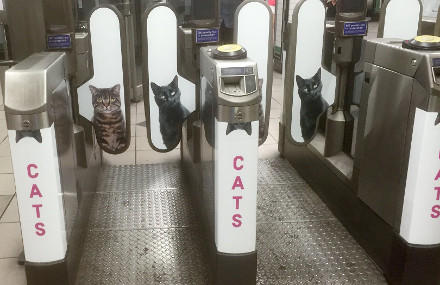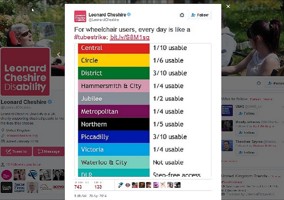Kirsty Weakley takes a closer look at a campaign that has been hitting the headlines.
Obviously there’s a lot we can all learn from cats, particularly how to spend the day lazing in the sunshine without a care in the world while others tend to our every need.
But I’m not talking about those cats, I’m talking about the Citizens Advertising Takeover Service, or CATS.
CATS launched a crowdfunding appeal earlier this year, aiming to raise £75,000 in order to replace the ads at a large tube station. This would have been amazing.
'The Glimpse'
The group behind the campaign calls itself the Glimpse, describing itself as a "group of friends who want to use creativity for good".
The campaign raised just over £20,000, which means it has been able to take over Clapham Common station (conveniently close to Civil Society Towers), replacing most of the ads with pictures of cats, much to the delight of commuters, residents and several national media outlets.
It’s also supporting the work of Battersea Dogs and Cats Home and Cats Protection by featuring moggies looking for new homes, which is nice for those charities.
But what else can charities learn about how the campaign was organised?
Why it worked
Well firstly, it’s a really simple idea that grabs people’s attention straight away. It’s also great play on words - journalists love words - so if your campaign includes some really clever wordplay then the media be all over it. (This can admittedly be a dangerous game to play, as if the wordplay is a bit naff, it will end up in the bin.)
The people behind CATS were very clear about what was needed. £75,000 to take over a big station or £23,000 to do most of a little one.
The group's Kickstarter page highlighted a number of levels of support, from £1 and the promise that someone would stroke a cat for you, to £2,500 to dedicate an entire poster to your feline.
Social success
Another of the campaign’s strengths was its viral or social nature.
Well before the campaign was being talked about on BBC Breakfast, it was being talked about on social media, with very little stewarding from the guys behind it.
Interestingly, they don’t appear to have created a ‘Cats Not Ads’ Twitter account, but are instead relying on just the search tag #catsnotads. They are really letting the supporters do the work.
While it is fun, there was a serious message underneath about the pressures of being bombarded with messages from large corporations 24/7. This helps to tip people from - ‘wow I hope that works’ to ‘I must give them all the money in my piggy bank’.
We mustn’t forget the mysterious law of the internet, which has decreed that people are compelled to click on any picture featuring a cat. This doesn’t help if you’re a hamster charity, but in other situations it’s worth remembering.
And the catchy video certainly didn’t do the campaign any harm.
A note of caution
Now I know I’m being a bit pernickety here, but sadly the campaign did not reach its target. Not enough people pledged money to take over an entire large station.
But that’s not how the media is reporting it. All the media reports I’ve seen say that all the advertising space is taken up by cats, and while the BBC omits the word 'all', it doesn't include the word 'most'.
I pass through Clapham Common at least twice a day, and sadly it's not quite true that all the ads are cats. Most of them are - and that’s pretty great. So why is everyone being economical with the truth?
It could just be that it’s an ‘easier story’, but I’m not sure I buy it. And I can’t help but feel that this is part of the creeping ‘post-truth’ society, where presidential candidates are allowed to claim that the incumbent founded so-called Islamic State, Brexit campaigners were able to drive around in a bus pledging £350m a week to the NHS without being properly scrutinised, and the British Prime Minister is able to ignore almost all the evidence suggesting that grammar schools do not improve social mobility.
But why does this matter? And should charities care? It matters because, having seen a few weeks ago the headline that all adverts at Clapham Common would be replaced with cats, I got really excited.
The date was etched on my brain and I came to work on Monday with more than the usual excitement about what the week had in store. Yet while there were a lot of cats at Clapham Common station, there was still posters encouraging me to eat at a local burger joint and switch to a different mobile phone provider.
I felt cheated. I had been promised pictures of cats.
This is an important lesson about managing expectations of supporters. Whether the campaign was complicit in the media deception or not, as a supporter I’m disappointed. Ultimately this would make me less likely to trust a similar campaign again, and less likely to believe media reports, which is bad for everyone.
Related articles












